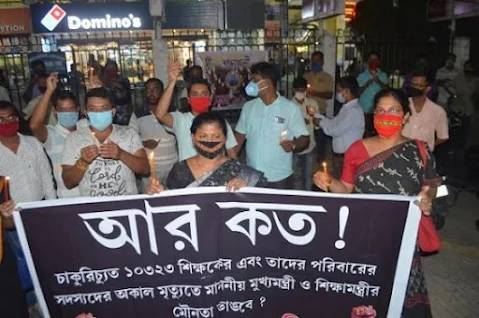In a historic milestone for the judicial system in Tripura, a full bench of the state's High Court is set to address the plea of 10,323 teachers who were unlawfully terminated.
In a historic milestone for the judicial system in Tripura, a full bench of the state's High Court is set to address the plea of 10,323 teachers who were unlawfully terminated. This case pertains to a long-standing issue of miscarriage of justice that has adversely affected not only these educators but also approximately 1 lakh individuals who depended on them. Remarkably, this will be the first time that such a full bench hearing will be live-streamed via YouTube, underscoring the immense significance of a case that has deeply impacted state politics for over six years.
Adding an extra layer of urgency and importance to this case and its livestreaming is the tragic fact that 160 of the retrenched teachers have passed away, with at least 30 of them taking their own lives.
According to a minority of legal experts, the entire matter was mishandled by the incompetent law department of the previous left front government due to a complete and gross misinterpretation of the original High Court order issued by then Chief Justice Deepak Kumar Gupta and Justice Swapan Chandra Das. Shockingly, without even thoroughly reviewing the complete order, or even its operative part, the law department provided misguided advice to the left front government, exacerbating the situation.
In paragraph 121 of the original order, the honorable justices had stated that the recruitment policy of the left front government was illegal and unconstitutional and needed to be set aside, which it was. However, there was no explicit direction to the government in this paragraph. The actual directive was provided in crucial paragraph 127, where the justices emphatically mentioned that their order would have a 'prospective effect.' In the specific case at hand, only those teachers whose jobs had been challenged on the grounds of recruitment rules—approximately 38 primary teachers by all accounts—were to be terminated. Instead of implementing this directive by retrenching those 38 teachers and possibly accommodating them in other government positions, the officials in the law department, who had failed to properly comprehend even the operative part of the judgment, advised the left front government to file an appeal to protect the annulled recruitment rules, incorrectly asserting that the jobs of all 10,323 teachers were at stake. This misstep led to a series of complications.
However, it's important to note that neither the Supreme Court nor the High Court ever stated that all the jobs of the 10,323 teachers had been lost. Despite this, the BJP government, similarly misguided by the law department, unlawfully terminated all of them through a single notification. This action came in direct violation of the commitment made by then Chief Minister Biplab Kumar Deb on October 2, 2019, to resolve the issue within two months. In December 2019 and January 2020, the unfortunate teachers resorted to a sit-in strike to protest their unjust dismissal but were met with force and dispersed by the police under Biplab Deb's leadership. Apart from contravening various service conduct rules, this mass termination order blatantly violated Article 311(2) of the Constitution, possibly marking an unprecedented event in India's post-independence history.
All these intricate legal and ethical issues are now poised to be addressed by the esteemed full bench of the High Court in an eagerly anticipated hearing scheduled for tomorrow. A multitude of stakeholders, including the state government, the ruling party, and opposition parties, are anxiously awaiting the outcome of this significant case.

Comments
Post a Comment